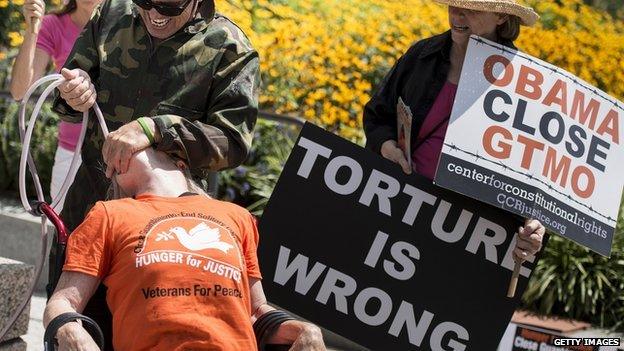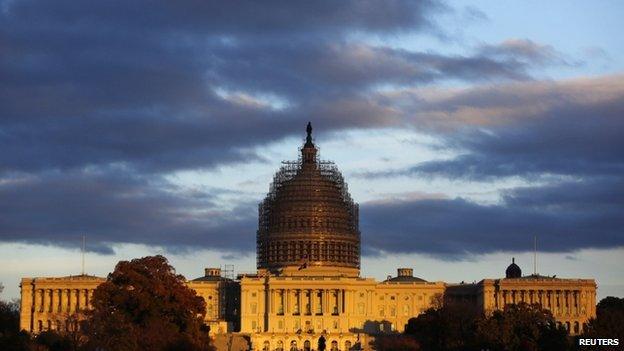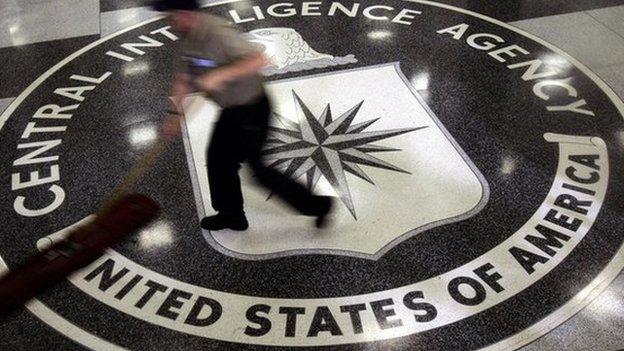CIA report: A tale of competing truths
- Published

With the Senate report on US interrogation of al-Qaeda suspects now in the public record, debate has shifted from hypothetical to the concrete.
In the hours after the Senate Foreign Relations Committee document was posted on the internet, journalists and interested parties began poring over the 500-page executive summary, highlighting its most controversial findings and drawing conclusions about its relevance.
"The core narrative that describes a barbarous, calculated, and sustained corruption of both our national values and our most fundamental moral principles is simple," writes, external Kevin Drum of Mother Jones. "We tortured prisoners, and then we lied about it. That's it."
The report is brutal, write, external the Daily Beast's Shane Harris and Tim Mak: "Interrogations that lasted for days on end. Detainees forced to stand on broken legs, or go 180 hours in a row without sleep. A prison so cold, one suspect essentially froze to death."
Rolling Stone's Tim Dickinson says, external the "rectal rehydration, without evidence of medical necessity" that some detainees underwent was "sexual assault, plus water".
Beyond the moral repugnancy of the specific examples cited, writes, external Vox's Max Fisher, the report shows that there was a "disastrous flaw" in the CIA's interrogation programme.
Many observers have noted with shock that the US government paid $81m, external (£52m) to two Air Force survival school psychologists, external who knew little about interrogation techniques or al-Qaeda. It's what they did know, Fisher writes, that's the most disturbing, however.
The two trained pilots on how to survive interrogation at the hands of brutal captors - which meant their interrogation programme was, in effect, a recreation of these cruel tactics.
"It was based on copying Chinese torture methods designed not to elicit truth but to force false confessions," he writes.
"The CIA could not borrow methods from a torture programme that was successful at eliciting factual information because no such programme exists, nor will it ever," he continues.
.jpg)
Does the Senate report on interrogations tarnish the CIA's image?
Other journalists took particular exception to the portion of the report that detailed how the CIA's public affairs department attempted to shape media coverage of the agency's practices.
"The government hates leaks of classified information. Except when it doesn't," writes, external the New York Times's Matt Apuzzo.
"The Senate report describes a CIA effort to reveal favourable classified information as a way to bolster support for its interrogation and detention programme," he continues. "Unlike other, unfavourable, stories that prompted leak investigations, reporter subpoenas and prison sentences, these disclosures led everyone to look the other way."
The Intercept's Dan Froomkin says, external the report shows that many of the reporters covering the CIA story weren't misled, they were willing participants in a deception.
"Many of the same news organisations you are trusting today to accurately inform you about the torture report were either naive or knowing dupes in a CIA misinformation campaign orchestrated by top CIA officials, that included leaks of information that was amazingly enough both classified and inaccurate at the same time," he writes.
Conservatives and former George W Bush Administration officials have countered the flood of criticism in part by noting that the report is the product of Senate Democrats who did not interview the CIA officials responsible for designing and implementing the interrogation programme (why those interviews didn't happen is an open question, external).
"There are two sides to every story, including this one," tweets, external former Bush press secretary Ari Fleischer.
"Would a congressional report written almost exclusively by GOP staff ever be treated as 'the Senate report' on anything?" asks, external the Weekly Standard's Stephen Hayes.
A little over an hour after the report's release, the Wall Street Journal's website published an opinion piece, external in which former CIA Directors George Tenet, Porter Goss and Michael Hayden and Deputy Directors John E McLaughlin, Albert Calland and Stephen R. Kappe defend their agency's record.
They call the report "a missed opportunity to deliver a serious and balanced study of an important public policy question".
"The committee has given us instead a one-sided study marred by errors of fact and interpretation - essentially a poorly done and partisan attack on the agency that has done the most to protect America after the 9/11 attacks," they write.
They contend, contrary to the report's findings, that the interrogation programme "helped us disrupt, capture or kill terrorists". Its legality was clearly established by the US Justice Department, they continue, and the allegation that CIA representatives misled Congress and administration officials is "flat-out wrong".
The authors of the Senate report forget the sense of urgency that existed in the days after the 9/11 attacks, they write.
"In this atmosphere, time was of the essence and the CIA felt a deep responsibility to ensure that an attack like 9/11 would never happen again," they say. "CIA officers knew that many would later question their decisions - as we now see - but they also believed that they would be morally culpable for the deaths of fellow citizens if they failed to gain information that could stop the next attacks."
For further information, the article directs readers to CIA Saved Lives, external. The website, run by "a group of former CIA officials with hundreds of years of combined service", further builds on the criticisms of the Senate Committee laid out in the Wall Street Journal.
"The committee selectively used documents to try to substantiate a point of view where ample and contrary evidence existed," they write. "Over five years and at a cost of $40m [£25m], the staff "cherry picked" through 6 million pages of documents to produce an answer they knew the majority wanted. In the intelligence profession, that is called politicisation."
In addition both the Senate committee's Republican minority, external and the CIA itself, external have now released competing reports.
As has become typical of Washington political debates, there's a "truth" out there for every opinion.
- Published8 December 2014

- Published9 December 2014

- Published31 July 2014
